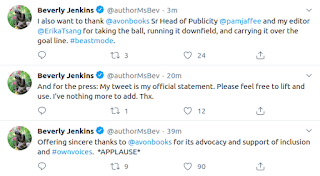The International Association for the Study of Popular Romance has issued a statement,
For over a
decade, the Romance Writers of America has been a generous sponsor of IASPR.
Every conference we have held has received RWA support, including our upcoming
2020 conference on “Diversity, Inclusion, Innovation” in popular romance
culture, and the field of popular romance studies has been seeded and sustained
by the RWA Academic Research Grant program.
However, in light
of
recent
events we as a scholarly organization must add our voice to the chorus of
readers, reviewers, editors, agents, and authors who have called for sweeping
and lasting change at the RWA, beginning with the eight steps listed in the “
Readers to RWA”
letter from Romance Sparks Joy:
- A clear, unequivocal statement that RWA is anti-racist and that
all of its policies, procedures, and activities will ensure that the
organization meets this standard.
- A public apology to Ms. Milan,
the Board members who have been compelled by their consciences to
resign this week, and members who have been harmed by the RWA as stated
above.
- The resignations of President/President-Elect Damon Suede and Executive Director Carol Ritter.
- An emergency election of new Directors to replace those who have resigned in protest.
- A
full, transparent, and independent investigation into the complaint,
investigation, and censure processes around RWA’s Code of Ethics, with
attention to events related to the complaints against Ms. Milan and
reports that ethics complaints by marginalized members were not
forwarded to the Ethics Committee by RWA staff.
- An accounting of
the actions that led to the creation of a secret ethics committee and
the Board’s initial vote against Ms. Milan.
- The removal of staff
if investigations demonstrate those staff members discriminated against
marginalized authors based on their identities, whether intentionally
or through negligence.
- An Action Plan developed with public
input to address the systematic exclusion, harassment, and lack of
support for marginalized members and prospective members at every level
of RWA, including chapters, conferences and events, staff prerogatives,
and Board action.
In keeping with that letter’s call for a “boycott of any events
sponsored by or affiliated with the national chapter of RWA,” and in
order to forestall any use of our conference to whitewash problems with
diversity and inclusion at RWA itself, we will budget for, plan, and, if
necessary, hold our 2020 conference this summer without using the
financial support that RWA has provided for it. We will reallocate
resources and seek out other funding in order to minimize the impact of
this decision on travel support for graduate students, untenured
faculty, and independent scholars.
We do not flatter
ourselves that IASPR, our conferences, and our affiliate publication, the
Journal
of Popular Romance Studies are somehow free from racism, exclusion, and
inequity, or that we will always succeed in addressing them. We do, however, hope
to respond to our failures by keeping in mind the advice that Prof. Jay Thalang
gives his graduate students—and, ultimately, takes to heart—in Courtney Milan’s
Hold Me:
“If you can’t get over your ego
and just talk about what you did and what happened, this will take four
times as long. You failed. Get used to it. Some of the biggest
scientific breakthroughs came about because someone failed and figured
out why. Don’t worry about failing. Worry about failing wrongly.”
So far in this matter RWA has not just failed, but failed wrongly. We
ask for better from them, and will try to do better ourselves. We hope
all organizations, including RWA, are able to embrace policy and
practice that sees and represents all of their talent.
----
Teach Me Tonight's coverage so far:
25 August 2019: "
Racism and the Corporate Romance Buyer: a "little fiasco" involving Sue Grimshaw"
24 December 2019: "
Racism, Literary Criticism and a "Safe and Respectful Environment"
26 December 2019: "
RWA turmoil continues"
28 December 2019: "
RWA and Broader Concerns"
And since the announcement mentions the RWA Academic Research Grant program, here's a link to the
winners, from 2005-2019.



















